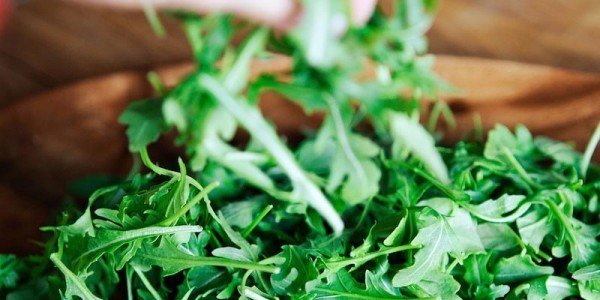Arugula

The botanical name of arugula is Eruca Sativa, it is also known under the names rocket, eruca, arugula. The properties of this annual plant from the Cruciferous family remain poorly studied for now.
But despite being relatively unpopular, arugula has a very long history.
It was used as a spice in Ancient Rome, and today it enjoys some popularity in Mediterranean cuisine – Italians use arugula leaves to prepare salads, pizzas, risottos and when preparing pasta dishes. Arugula can replace basil in pesto sauce.
Arugula – useful properties
100 grams of the herbaceous plant contains 25 grams of calories, 1 gram of proteins, 1 gram of carbohydrates, sugars 1 gram, 8 milligrams of sodium, about 15 mg. vitamin C, up to 48 mg vitamin B9, up to 1.8 mg. vitamin A, etc.
Arugula is also a very good source of the following trace elements – potassium, calcium, magnesium, iodine, iron, etc.
The biologically active substances contained in the plant contribute to improving digestion.
In addition, arugula has been known since ancient times for its diuretic, expectorant, antibacterial and lactogonic properties.
Modern research confirms the fact that regular consumption of arugula helps to:
- strengthening the immune system;
- normalizing water-salt exchange;
- increasing hemoglobin levels;
- reducing blood sugar;
Some scientists believe that arugula reduces the risk of developing malignant diseases.
It is recommended for overweight people to consume arugula, as it contains a small amount of calories and also stimulates metabolic processes in the body.
A valuable quality of arugula is that when it is used for weight loss, thanks to the biologically active substances contained in it, a person retains his ability to work.
This is especially important during a period of dieting to normalize body weight, when most people feel very low and on the verge of a nervous breakdown.
With a portion of salad for lunch or dinner, a person can maintain their body weight within normal limits permanently.
Arugula leaves are a very good source of vegetable fiber, but they contain few calories and as a result, the feeling of satiety is maintained for a long time.
What diseases can be treated with the help of arugula?
The herb has very good therapeutic properties, it can even prevent the development of stomach ulcers.
Even American gastroenterologists offer it to their patients as an alternative and safe method of treatment. For this purpose, a person should consume arugula as often as possible.
If he does this, the walls of his stomach will strengthen and so it will not be possible for bacteria to penetrate them.
The results of the studies conducted on mice show that components of the herb have an anti-ulcer effect on laboratory animals suffering from gastritis and stomach ulcers.
Arugula is also considered an aphrodisiac. It has a beneficial effect on male potency.
To increase sexual desire and for a better erection, Italian chefs have prepared the following recipe – 100 grams of rucola leaves are crushed and 10 grams of black pepper and 10 grams of honey are added to them. copper.
Arugula oil is known for its bone-strengthening properties, making it useful to take both externally and internally.
Arugula should be consumed with special care by people who suffer from kidney stone disease.



